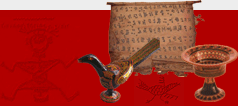|
彝族古乌撒地区的职业社区制探析
Analysis of Occupational Communities in the Traditional
Yi Vusa Area
王继超 Wang Jichao
贵州省毕节地区彝文翻译组
【摘要】古乌撒地区:即唐宋时称之“乌蛮三十七部”之一的乌撒地区,这一地域概念形成于魏晋时期,消失于清朝初年,其间地域扩大或缩小。职业社区制,是古乌撒彝区曾经实行的一种住民居住制度,在乌撒部政权的支配作用下,把具有共同族群特征(文化、语言、风俗习惯、心理素质)、同一社会分工而从事同一种职业的人们相对集中居住在一片相对固定的区域,如稻民、牧民和铁、石、木、竹、毡等工(匠)村落,职业社区就是对这样一些典型村落遗存现象作学术上的界定。这种职业社区制的存在,巩固了古乌撒部政权长达千余年割据一隅的统治,并对彝族多支系的形成提供了基本土壤。虽系特殊现象遗存,但却具有一定的普遍意义。文章通过职业社区制在今黔西北部分地区的遗存、乌撒地区职业社区制形成的历史背景、职业社区的补充与民族关系、作者的思考与结论等章节的论证,得出研究彝族社会历史,不可不研究彝族的支系,不可不研究彝族支系存在与职业社区相关的成因的结论。
Abstract
Ancient Vusa Area once was called “Wu man san shi qi
bu” in the Tang and Song Dynasties. This geographic concept
formed in the Wei and Jin periods, and disappeared in the
early years of the Qing Dynasty. During the years it existed,
its territory expanded and contracted alternately. The Occupational
Community System (OCS) was a kind of living system of its
inhabitants once conducted in the Ancient Vusa Yi Area.
Under the dominion of the Vusabu authority, people of the
same character and of the same occupation were gathered
to live together in a fixed area, such as the village of
paddy, wood, and bamboo. “Occupational community” is the
academic definition of these representative village communities.
The OCS solidified the rule of ancient Vusabu authority
during its over 1,000 years’ time span, and provided the
basic ground for the formation of many branches of Yi nationality.
Although it is a special phenomenon, it possesses a general
significance. Through the relics of the OCS in some parts
of the Northwest area of Guizhou Province, the historical
background of the forming of OCS in Vusa areas, the complementarity
of the occupational community and the ethnic relations,
and the argumentation of author’s thinking and conclusion,
this article comes to the conclusion that to research the
social history of the Yi ethnic group, we cannot dismisss
the study of the branches of Yi people and their relationships
with the OCS.
作者简介:
王继超(阿洛兴德),副译审,贵州省毕节地区彝文翻译组组长。整理翻译并公开出版彝文古籍30部61卷800余万字,有《彝族源流》(6部27卷)、《彝文典籍目录》、《彝族指路丛书》(7卷)、《物始纪略》(3部6卷)、《黔西北彝族美术》、《彝族美术》、《曲谷精选》、《曲谷走谷选》、《支嘎阿鲁王》、《彝文指路经集译·威宁卷》、《赛特阿育》、《苏巨黎咪》、《乌鲁诺纪》、《益那悲歌》、《明清彝文书法汇集》、《彝文书法字帖》、《估哲数·农事篇》、《摩史苏》、《阿买恳》、《乌蒙彝族指路书》、《彝文金石图录》(第3集)、《彝文古籍翻译与历史文化研究》等译著作、文集公开出版发行;主持整理、翻译、出版《西南彝志》、《简明彝汉字典》、《诺沤曲姐》、《阿诺楚》、《彝文文献释名集》等15部成果,约400余万字。即将出版的成果还有《中国少数民族古籍总目提要·彝族卷》、《支嘎阿鲁传》、《彝族军事文献》等200余万字。获国务院民族团结进步模范个人2次,入选《黔中英才》、获毕节地区首届突出贡献知识分子称号。
About the Author:
Wang Jichao (Alu Xide), head of the translation
team of Yi language in Bijie District, Guizhou province,
has classified, translated and published 30 sets of ancient
books of Yi nationality with 61 volumes and over 8,000,000
characters. He has published translation works and corpora
such as The Origination of the Yi Ethnic Group (6 sets and
27 volumes), Catalogue of Classic Books of Yi Language,
A Series of Road Guide Scriptures of Yi People (7 volumes),
Synopsis of Creation and Civilization (3 sets and 6 volumes),
Yi Fine Arts in Northwest Guizhou, Fine Arts of Yi Ethnic
Group, Qugu: Choiceness of Guizhou Yi Love Songs, Selection
of Quguzhougu Folk Songs, King Zhyge Alu, Road Guide Scriptures
of Yi People of Weining Area, Saite Ayu, Suju Limi, Wulu
Nuoji, Elegy of Yelang, A Collection of Yi Calligraphy of
the Ming and Qing Dynasties, The Copybook of Yi Calligraphy,
Guzheshu: Book of Agriculture, Moshisu: Master Singer Books
for Funeral, Amaiken: Guizhou Yi Wedding Ceremonial Songs,
Road Guide Scriptures of Yi People of Wumeng Area, Yi Metal
and Stone Inscriptions (the third Vol.), The Translation
of Ancient Books in Yi Language and the Research of History
and Culture. And he has also taken charge of classifying,
translating, and publishing 15 sets of works with 5,000,000
characters, such as: Chorography of Yi People in Southwest
China, Concise Dictionary of Yi and Chinese, Nuo’ou Qujie,
Anuochu, The Collection of Translated Terms of Yi Language.
The achievements about to be published include “Synopsis
of Ancient Books of China’s Ethnic Minorities: Volume of
Yi People”, “A Biography of Zhyge Alu”, and “Historical
Documents of Yi Military.” He was rewarded by the State
Council, as Man of Unity, Progress and Exemplar. And he
was also recognized as an “Intellectual of Outstanding Achievements”
in the Bijie District.
|





